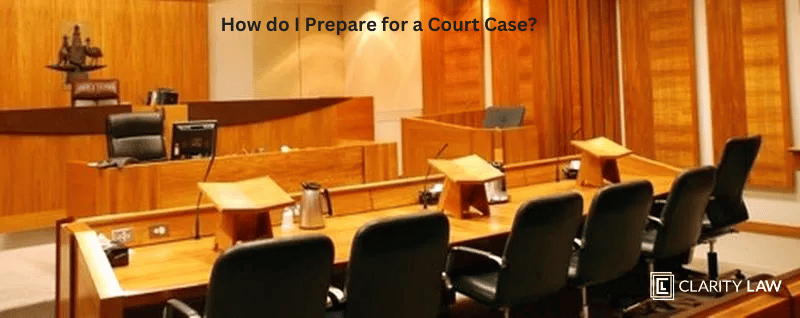
Introduction
How you prepare for a court case is very much dependent on the type of matter you have and what you intend to do with it. This article covers some of the basic preparation you should do if represented by Clarity Law.
Instructions
The most basic thing you need to do is provide us with “instructions”. Providing instructions means you tell us what you want to do with your case. It also means giving us information and documents which could be helpful for your case. Your instructions will also provide us with useful background about you and your case. We will confirm your instructions in writing so we are clear on what you want us to do.
Sometimes, instructions are straightforward. If you wish to plead guilty to a mid-range drink driving offence and make an application for a work licence, then we know we need to prepare affidavits and then represent you in court.
If you want us to commence negotiations with the prosecution, then we would analyse prosecution evidence and draft arguments.
In essence, your instructions guide the direction of the case.
Personal or Trial Statements
If you want us to represent you for a plea of guilty for a serious offence, we will often ask you to provide a personal statement. This will tell us information about your background, such as: where you grew up, what grade you got to in school, and whether both parents were around. It will include your work history and may contain psychiatric and substance use history. The purpose is for us to get a better understanding of who you are, and then to present that in a way most helpful to you in court.
Let us assume your charge is drug possession. If you grew up in a household where drug taking was normal, and you first tried drugs when you were 13, this would be important for the Court to know. We could only share such things with the Court by getting it from you.
A trial statement is something different in nature. If you want to take your case to trial, then we will need the exact basis on which you are contesting each charge. We will ask you to write a paragraph-by-paragraph response to the police case / complainant’s statement. This allows us to understand the grounds on which you contest the case, and helps us form the basis for a case theory. The case theory informs the case strategy. We need a case strategy to win.
Documents
We will commonly ask you to give us documents such as character references, medical notes, or any proof of rehabilitation, if relevant. These will be used as supporting material in court.
Sometimes your documents can help us with drafting negotiations to the prosecution. Let us say you are charged with unlicensed driving while SPER suspended. Maybe you did not know your driver licence was suspended because SPER sent a letter to your old address. If you gave us a copy of your driver licence confirming your current address, we could use that to back-up your claim you did not know.
Rehabilitation
When a Court sentences you, it must consider sentencing principles. One of the principles in your favour is rehabilitation. Rehabilitation means any efforts you have made to change your habits or circumstances since the offence.
If you are charged with a drink or drug driving offence, then we will usually recommend you undertake the "Queensland Traffic Offenders Program".
If you are charged with an offence of violence, then it is often wise to undertake anger management or other counselling.
If you are charged with a domestic violence offence, then undertaking a program such as “Men Choosing Change” would be a good choice.
If you are charged with a drug offence, then getting clean drug screens or residential rehabilitation would be suitable.
Writing a letter of apology to the complainant would show that you have insight into your wrongdoing, and demonstrates remorse. Demonstrating remorse can persuade a Court you are more likely to rehabilitate.
There are many ways to prove rehabilitation, and we can advise you of the most effective way to do so, based on the circumstances of your case. The key is to do it and then prove you have done it.
Choosing an Outfit
When attending a court, we recommend business wear; something that looks professional. This shows a degree of respect to the Court and shows that you are taking the case seriously. You may be surprised some people present to Court in a singlet, shorts, and thongs. We cannot prove they get worse outcomes due to their appearance, but basic psychology would suggest it could be a factor.
Conclusion
These are some, but not all, of the main ways in which you can prepare for your case. If you are engaging us then you will naturally expect us to do most of the work, but there are some things we will need you to do to help us prepare your case. Suffice it to say, if you follow through on the preparation that we ask of you, it will only help things go in your favour when we represent your interests.






